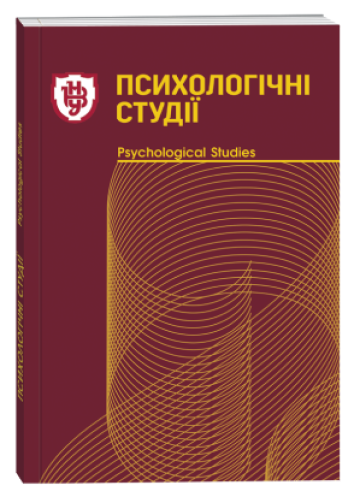EMPIRICAL ANALYSIS OF THE MANIFESTATION OF POST-TRAUMATIC GROWTH IN COMBATANTS
DOI:
https://doi.org/10.32782/psych.studies/2023.3.3Keywords:
post-traumatic growth, combatants, psychological assistance, values, lifeAbstract
Psychological assistance to combatants involves not only overcoming the symptoms of post-traumatic disorders and their consequences, but also creating conditions for their personal development. The analysis of empirical data was carried out on the basis of the theoretical model of post-traumatic growth of S. Joser. The main idea of the model is the understanding that all personality changes are related to the development of the spiritual and emotional sphere. The model determines the directions of post-traumatic growth: interpersonal relationships, changes in the perception of one's own self, and changes in life philosophy. The main thing in post-traumatic growth is changes in the perception of one's own self. They involve a person's focus on the development of personal qualities and characteristics, resistance to adversity, responsibility, stress resistance, etc. The analysis of empirical data proved that the biggest changes occurred in the change of one's own self and in the life philosophy of military personnel. The biggest changes were noted by the respondents in understanding the value of their own life, changing priorities regarding what is important in life, ability to direct one's life to achieve new goals. In interpersonal relationships, post-traumatic growth is moderate. The survey demonstrated problems in military personnel expressing their emotions and accepting positive character traits from other people. In general, traumatic events present a completely new experience to a person, which he did not have time and opportunities to understand and comprehend. This experience is processed by a person after the trauma itself. Delineating ways to combine new experience with previously acquired and understood presupposes the beginning of recovery. Restoring the usual coordinates of one's life, despite the trauma and upheaval, involves building a new life model that will include the experience of trauma and allow one to manage one's life.
References
Бульчик Т.І., Мушкевич В.О. Емоційні та поведінкові прояви військовослужбовців, що перебували в зоні бойових дій. Психологічні студії. 2022. № 1. С. 24–32.
Ганаба С.О. Сенс життя як екзистенційна цінність у поглядах Віктора Франкла. Актуальні проблеми філософії та соціологія. 2022. № 35. С. 3–8.
Климчук В.О. Посттравматичне зростання та як можна йому сприяти у психотерапії. Наука і освіта. 2016. № 5. С. 46–52.
Нечитайло Т.А., Лісова О.С., Фесун Г.С. Особливості прояву агресії у військовослужбовців у зв’язку з умовами служби і званнями. Психологічні студії. 2022. № 1. С. 55–63.
Носенко Е.Л., Коврига Н.В. Емоційний інтелект: концептуалізація феномену, основні функції. Київ : Вища школа, 2003. 126 с.
Франкл В. Людина в пошуках справжнього сенсу: Психолог у концтаборі. Харків : Клуб сімейного дозвілля, 2016. 286 с.
Ясперс К. Комунікація. Першоджерела комунікативної філософії / за ред. Л.А. Ситниченко. Київ : Либідь,1996. С. 140–156.
Antonovsky A. Health, Stress and Coping. San Francisco : JosseyBass, 1979.
Elder G.H., Clipp E.C. Combat experience and emotional health: Impairment and resilience in later life. Journal of personality. 1989. № 57. Vol. 2. Р. 311–341.
Joseph S. Growth Following Adversity: Positive Psychological Perpective on Posttraumatic Stress. Psyclological Topics. 2009. Vol. 18(2). Р. 335–344.
Posttraumatic growth among Gulf War I veterans: The predictive role of deployment-related experiences and background characteristics / Maguen S. et al. Journal of Loss and Trauma. 2006. № 11. Vol. 5. P. 373–388.
Strengths of character and posttraumatic growth / Peterson C. et al. Journal of traumatic stress. 2008. № 21. Vol. 2. P. 214–217.
Snyder M. Self-monitoring of expressive behavior. Journal of Personality and Social Psychology. 1974. № 30. P. 526–537.
Tedeschi R.G., Calhoun L.G. Posttraumatic growth: conceptual foundations and empirical evidence. Psychological Inquiry. № 1. Vol. 15. P. 1–18.







